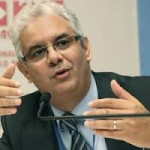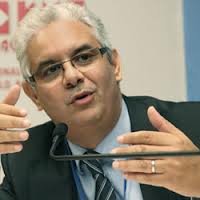Emerging Markets
 Jon Marks – Morocco’s first dollar bond of modern times will help ease pressures from rising domestic debt and will boost the country’s standing with foreign investors, finance minister Nizar Baraka told Emerging Markets. The plan highlights the contrast between Morocco and other Arab Spring countries, which have been unable to attract funds because of political uncertainty. Morocco will launch the bond in November, Baraka said, to raise between $700 million and $1 billion, with markets expected to respond positively to an issuer that has weathered both the Arab Spring uprisings in its region and recession in its main commercial partner, the eurozone. The issue is expected to “consolidate perceptions that Morocco began its democratic transition earlier [than other Arab states]… and we have been best prepared” to accommodate large-scale financing flows, Baraka said in an interview on Wednesday. “The dollar market is deeper and we hope that Morocco will get an attractive spread, which will determine how much we borrow – everything will depend on the rate,” he said. Morocco has drawn in funds from the billions available in loans, grants and investment, while Egypt, Tunisia and other Arab Spring countries have been unable to absorb much-needed external finance as they work out their new political arrangements. This support, and a “countercyclical” public investment drive, have allowed Morocco to maintain growth even while the eurozone has nose-dived. A recovery in investment this year, after a 25% slump in foreign direct investment during 2011 as the Arab revolutions unfolded, means that “we have no growth crisis – we calculate the eurozone crisis will only cost us 0.3% of GDP this year, due to the measures we have put in place,” Baraka said. State investment spending has been hiked, while the government seeks to cut subsidies – estimated to cost 50 billion dirhams ($4.5 billion) this year, even after a fuel price hike earlier this year saved 9 billion dirhams. Subsidies should come down to 40 billion dirhams in 2013, Baraka said – although he declined to say how this sensitive issue will be tackled. External and domestic debt is rising but multilateral support is growing fast. World Bank facilities have doubled to around $700 million a year, and could reach $1 billion in 2013; the EU is providing E200-240 million and the African Development Bank $1 billion annually, while “the entry of the EBRD will offer new opportunities, especially to our private sector”, Baraka said. Gulf investors are an important source of funds and bilateral support, which has been cultivated by King Mohammed VI. Kuwait, Qatar, Saudi Arabia and the UAE last year each committed grants worth $1.25 billion over the next five years, although nothing has been disbursed yet, Baraka said.
Jon Marks – Morocco’s first dollar bond of modern times will help ease pressures from rising domestic debt and will boost the country’s standing with foreign investors, finance minister Nizar Baraka told Emerging Markets. The plan highlights the contrast between Morocco and other Arab Spring countries, which have been unable to attract funds because of political uncertainty. Morocco will launch the bond in November, Baraka said, to raise between $700 million and $1 billion, with markets expected to respond positively to an issuer that has weathered both the Arab Spring uprisings in its region and recession in its main commercial partner, the eurozone. The issue is expected to “consolidate perceptions that Morocco began its democratic transition earlier [than other Arab states]… and we have been best prepared” to accommodate large-scale financing flows, Baraka said in an interview on Wednesday. “The dollar market is deeper and we hope that Morocco will get an attractive spread, which will determine how much we borrow – everything will depend on the rate,” he said. Morocco has drawn in funds from the billions available in loans, grants and investment, while Egypt, Tunisia and other Arab Spring countries have been unable to absorb much-needed external finance as they work out their new political arrangements. This support, and a “countercyclical” public investment drive, have allowed Morocco to maintain growth even while the eurozone has nose-dived. A recovery in investment this year, after a 25% slump in foreign direct investment during 2011 as the Arab revolutions unfolded, means that “we have no growth crisis – we calculate the eurozone crisis will only cost us 0.3% of GDP this year, due to the measures we have put in place,” Baraka said. State investment spending has been hiked, while the government seeks to cut subsidies – estimated to cost 50 billion dirhams ($4.5 billion) this year, even after a fuel price hike earlier this year saved 9 billion dirhams. Subsidies should come down to 40 billion dirhams in 2013, Baraka said – although he declined to say how this sensitive issue will be tackled. External and domestic debt is rising but multilateral support is growing fast. World Bank facilities have doubled to around $700 million a year, and could reach $1 billion in 2013; the EU is providing E200-240 million and the African Development Bank $1 billion annually, while “the entry of the EBRD will offer new opportunities, especially to our private sector”, Baraka said. Gulf investors are an important source of funds and bilateral support, which has been cultivated by King Mohammed VI. Kuwait, Qatar, Saudi Arabia and the UAE last year each committed grants worth $1.25 billion over the next five years, although nothing has been disbursed yet, Baraka said.
.







